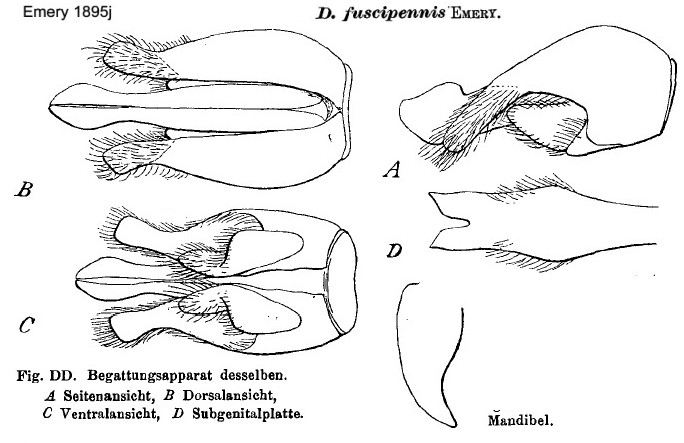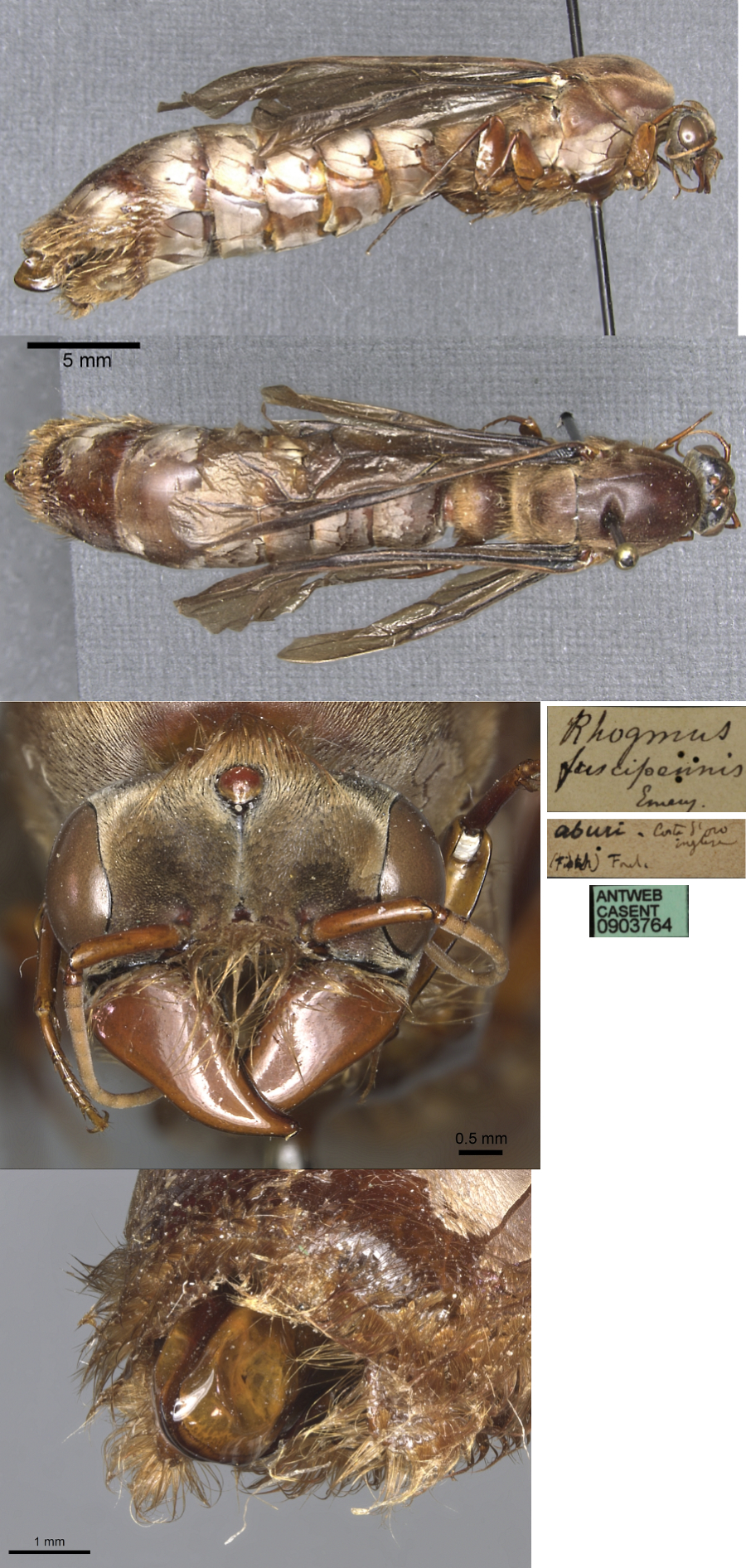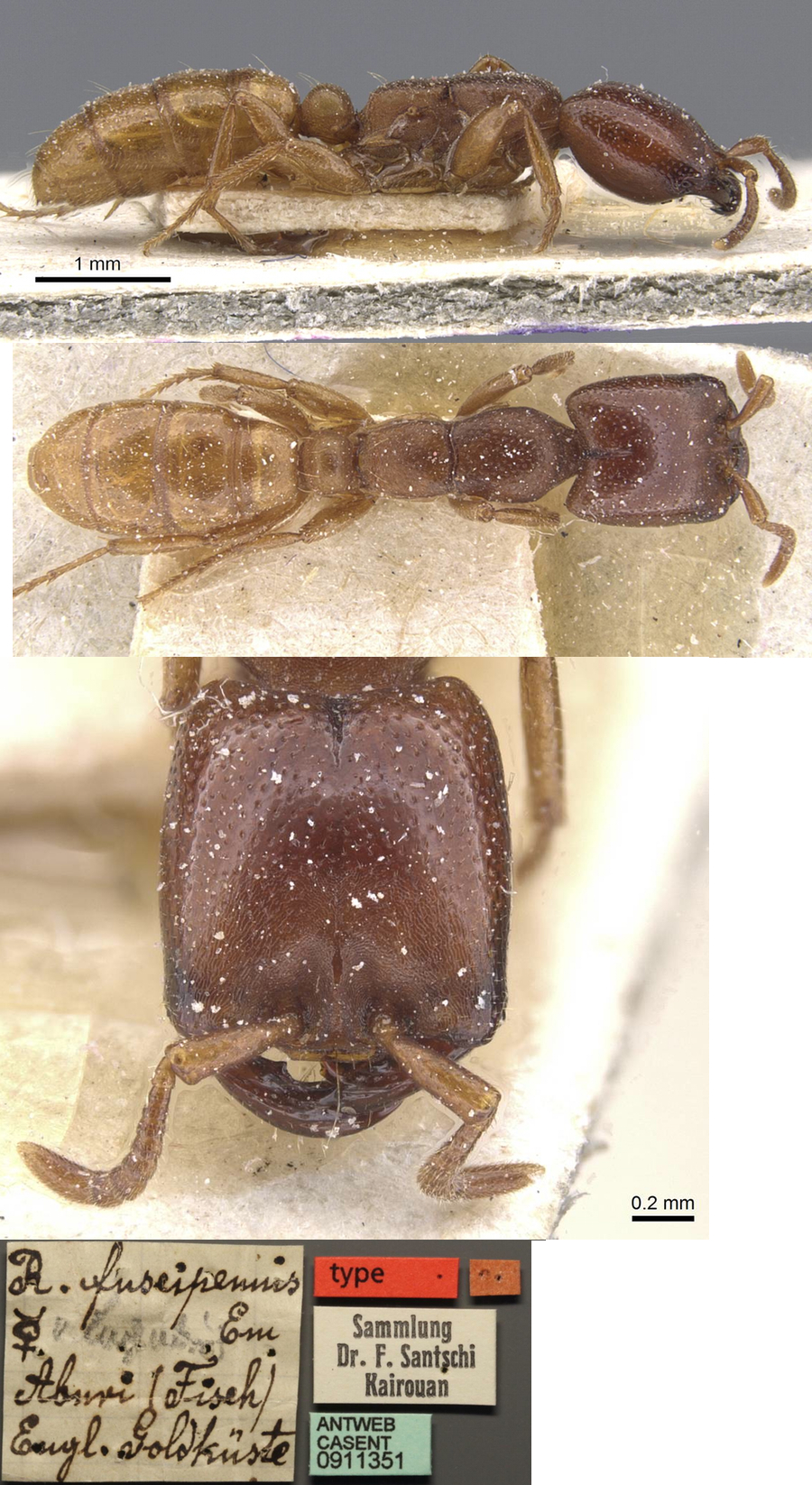Dorylus (Rhogmus) fuscipennis Emery
 Male Male 
 Type location Ghana (Rhogmus
fuscipennis, n. sp., Emery, 1892d: 570, male only; D.
fuscipennis in Emery, 1895j: 737; Forel, 1909d: 224, footnote,
worker; Forel, 1913h: 349, full worker description), collected by Ch.
Alluaud, at Assinie, now in Ivory Coast
but the area borders on Ghana - no images on Antweb (July 2014). Worker
described in full by Forel (1913h: 349), with collection details the
same as for the male lugubris,
i.e. Aburi, Ghana, by Fisch - see below. Type location Ghana (Rhogmus
fuscipennis, n. sp., Emery, 1892d: 570, male only; D.
fuscipennis in Emery, 1895j: 737; Forel, 1909d: 224, footnote,
worker; Forel, 1913h: 349, full worker description), collected by Ch.
Alluaud, at Assinie, now in Ivory Coast
but the area borders on Ghana - no images on Antweb (July 2014). Worker
described in full by Forel (1913h: 349), with collection details the
same as for the male lugubris,
i.e. Aburi, Ghana, by Fisch - see below.
junior synonym
lugubris (Dorylus
(Rhogmus) fimbriatus Em.
var. lugubris n. var.,
Santschi,
1919b: 232, male; synonymy here)
from Ghana, collected at Aburi, by Fisch -
see below
subspecies
marginiventris (Dorylus
(Rhogmus) fimbriatus Em. var. marginiventris
n. var., Santschi, 1919b: 233, male) from Ivory
Coast, collected at Dimbroko, by Le Moult; both the latter
corrected by Santschi, 1919h: 91, to place these under fuscipennis
and not fimbriatus) - see http://www.antweb.org/specimenImages.do?code=casent0911352
male and worker known (see Bolton, 1995)  . .
|
 Emery's
(1892d) description of the male is at Emery's
(1892d) description of the male is at  . Emery's (1895j) has a description with
illustrations of the male, which is at . Emery's (1895j) has a description with
illustrations of the male, which is at  . Forel's (1913h) description of the worker
is at . Forel's (1913h) description of the worker
is at  . Santschi (1919b) notes the male of marginiventris
as with a brighter red alitrunk, the gaster with all segments with a
darker brown posterior border, and the head blackish, see . Santschi (1919b) notes the male of marginiventris
as with a brighter red alitrunk, the gaster with all segments with a
darker brown posterior border, and the head blackish, see  . .
Forel (1913h) reported the worker "not previously
described" -
TL 3.8-6.9 mm; mandibles elbowed basally, then quite strongly curved
and armed with 3 teeth as some distance, with the apical tooth pointed,
long and curved, and the other two large and triangular ; mandibles
strongly and densely puncturate, smooth between the punctures. Head
rectangular, a little longer than wide (up to one-fifth longer); with
straight sides and the occiput deeply scalloped in an arc; posterior
angles somewhat flared, abruptly and feebly rounded; but the occiput is
distinctly flattened. A quite deep occipital notch, continues forward
centrally into the post-clypeal notch. Frontal carinae short and
distinctly separated. Anterior border of clypeus feebly protruding
medially, being a little merged with the frontal carinae. Antennae
10-segmented in largest morph and in the smallest. Scape not reaching
the mid-line of the head. Eyeless. Thorax narrower than the head, with
a single very distinct, quite deep, suture set a little forward of the
mid-point; dorsal profile almost flat; dorsum of propodeum about as
wide as long, subbordered and three times as long as the declivity.
Petiole node one and a quarter times wider than long, slightly narrower
at the anterior. Postpetiole wider than long, not much larger than
petiole. Gaster slightly waisted behind the postpetiole.
Head densely, grossly and deeply puncturate; the puncturation being
slightly less profound on the thorax; and much finer and more spaced
out on the pedicel and gaster. Thorax and pedicel sub-opaque, with
similar sculpture but more reticulate; gaster somewhat shiny and feebly
reticulate; the posterior two-thirds of the head is smooth between the
punctures.
Almost no erect hairs; pubescence semi-decumbent, short, yellowish and
distinct on the appendages; sparse on the body.
Head and mandibles rust or brownish; thorax reddish; petiole, gaster
and appendages yellow or slightly rust.
Specimens from Aburi, Ghana, collected by Fisch with the males
marching in the column. "I have had the worker for a long time but had
neglected to describe it before".
The status of the specimens is confusing if, as Wheeler
had it, the original description of the male was by Emery (1895,
illustrated) from "West Africa, Haitifi?" but Emery (1901c) separated
the major worker from fimbriatus on the grounds of fuscipennis
having antennae with ten segments (11 in fimbriatus; Forel
(1913h) described the worker from Aburi collected by Fisch and yet
Santschi (1919b) purported to describe the lugubris male from
the same location and by the same collector?.
Also known from Congo (Wheeler, 1922).
|
 The
photomontage is of a male, from the collection label this is lugubris, from Ghana, Aburi,
collector Fisch; collated
from http://www.antweb.org/specimen.do?name=casent0903764.
See also http://www.antweb.org/specimenImages.do?code=casent0911350. The
photomontage is of a male, from the collection label this is lugubris, from Ghana, Aburi,
collector Fisch; collated
from http://www.antweb.org/specimen.do?name=casent0903764.
See also http://www.antweb.org/specimenImages.do?code=casent0911350.
|
 The
photomontage is of a worker from Ghana, Aburi,
collector Fisch; collated
from http://www.antweb.org/specimen.do?name=casent0903764. Note the defaced label has lugubris, but the details are as given by Forel (1913h). The
photomontage is of a worker from Ghana, Aburi,
collector Fisch; collated
from http://www.antweb.org/specimen.do?name=casent0903764. Note the defaced label has lugubris, but the details are as given by Forel (1913h).
|
Oxford University Museum
specimens
Dorylus (Anomma) fuscipennis
B Taylor det.
Male
|
Central African
Republic
P Annoyer
1998
|
16.vi.1998
Dzanga-Sangha
|
Bayanga-Lidjombo;
U.V. 19h-05h; LAYON PK 21 5.0 RCA |
2
|
 |
Dorylus (Rhogmus) fuscipennis
B Taylor det.
Male |
Central African
Republic
P Annoyer
Di-14
|
20.i.2005
Dzanga-Sangha
03°55’13.2" N
16°36’46.1" E
|
U.V : 2h-6h, après
Sefka (entre Bambio et croisement Nola/Berberati), dans layon
forestier;
from on a reduviid bug; collected in forest, 1st hour of the morning;
536m asl
|
1
|
 |
Dorylus (Rhogmus) fuscipennis
B Taylor det.
Male |
Central African
Republic
P Annoyer
JW
|
19.x.2008
Dzanga-Sangha
03°01'49.5" N
16°08'31.7" E
|
567 m; Camp 2;
18h-2h; A la base du kungu, à 50 m du camp
|
1
|
 |
Dorylus (Rhogmus) fuscipennis
B Taylor det.
Male |
Central African
Republic
P Annoyer
HI
|
13.x.2008
Dzanga-Sangha
04°22'19.4" N
18°35'49.7" E
|
360 m; Camp 1;
17h30-3h;
A la base de l'Ayous (Triplochiton
scleroxylon, Sterculiaceae) à 50 m du Camp
|
1
|
|
Dorylus (Rhogmus) fuscipennis
B Taylor det.
Male |
Central African
Republic
P Annoyer
KT
|
23.x.2008
Dzanga-Sangha
03°01'49.5" N
16°08'31.7" E
|
567 m; Camp 2;
18h-6h; Sur plate-forme à 40 m du sol dans un kungu, à 50 m du camp
|
1
|
|
Dorylus (Rhogmus) fuscipennis
B Taylor det.
Male |
Central African
Republic
P Annoyer
JL
|
17.x.2008
Dzanga-Sangha
03°03'58.3" N
16°08'59.6" E
|
528 m; Camp 1;
17h30-2h;
A la base de l'Ayous (Triplochiton
scleroxylon, Sterculiaceae) à 50 m du Camp
|
1
|
|
Dorylus (Rhogmus) fuscipennis
B Taylor det.
Male |
Central African
Republic
P Annoyer
KF
|
21.x.2008
Dzanga-Sangha
03°01'49.5" N
16°08'31.7" E
|
567 m; Camp 2;
17h30-3h30; A la base du kungu, à 50 m du camp
|
1
|
|
|
 The photomontage is of
a male from the Central
African Republic, Dzanga-Sangha NP; collector Philippe Annoyer (Di
on reduviid). The photomontage is of
a male from the Central
African Republic, Dzanga-Sangha NP; collector Philippe Annoyer (Di
on reduviid).
|
 The photomontage is of
a male from the Central
African Republic, Dzanga-Sangha NP; collector Philippe Annoyer (CAR
1998-10). The photomontage is of
a male from the Central
African Republic, Dzanga-Sangha NP; collector Philippe Annoyer (CAR
1998-10).
|
|